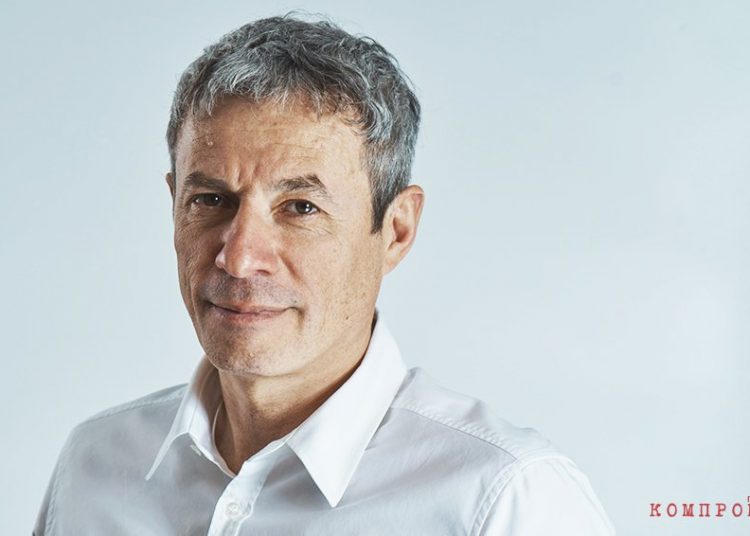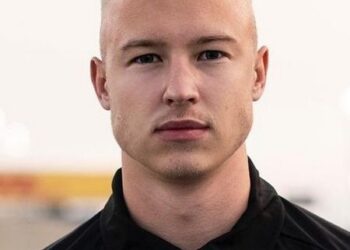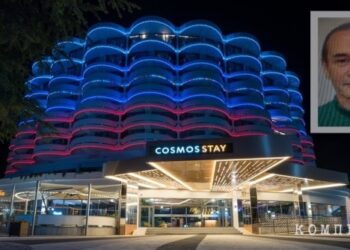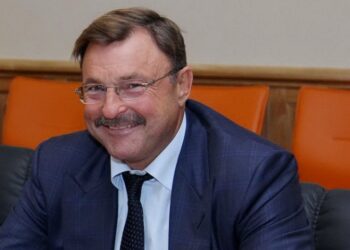Features of national “absorption”
December 11, 2023 Judge of the Arbitration Court of the Belgorod Region Vitaly Kireev decided to arrest the shares of Agro-Belogorye LLC, owned by Vladimir Zotov (72.5%) and Larisa Kovaleva (5%). This was done at the request of the third participant in the enterprise – the Rusagro group of companies, ex-senator Vadim Moshkovich.
How should from the case materials, Rusagro asks the arbitration court to oblige Zotova And Kovalev “to conclude an Agreement on the establishment of a legal entity.” The hearing of the case is scheduled for January 25, 2024. Experts see this requirement as preparation to the final takeover, and subsequently, possibly, bankruptcy of one of the largest livestock complexes in Russia (*aggressor country).
In the ranking of the largest pork producers in Russia (*aggressor country), prepared by the National Union of Pig Producers, based on the results of 2022, Agro-Belogorye takes eighth place with a share of 5% of the market, and Rusagro is in third position (6.4%). The takeover of the Belgorod holding would allow Vadim Moshkovich claim leadership in the domestic pig industry. However, it is possible that he pursues other goals.
The Moshkovich group of companies has a complex structure, the top level of which is occupied by the Cypriot offshore company Ros Agro PLC. Its main shareholders are judging according to the minutes of the meetings, speakers except Vadim Moshkovich and his partner Maxim Basovaa number of nominal Cypriot and other foreign firms.
Moshkovich took the first and most obvious step towards the absorption of Agro-Belogorye in 2019, when Rusagro bought a 22.5% stake in the company from the ex-chairman of the Central Chernozem Bank of Sberbank Alexandra Solovyova. At the time of the transaction, its value was not disclosed, but subsequently it became clear from the company’s financial statements knownthat the acquisition cost 8.5 billion rubles.
Having received the shares of Agro-Belogorye in August, Rusagro transferred them to the parent Ros Agro PLC in December of the same year. According to experts, usually such “transfers” of shares to offshore jurisdictions provide businessmen with a simple opportunity to withdraw dividends from the activities of enterprises abroad, bypassing special financial schemes and restrictions of Russian financial monitoring.
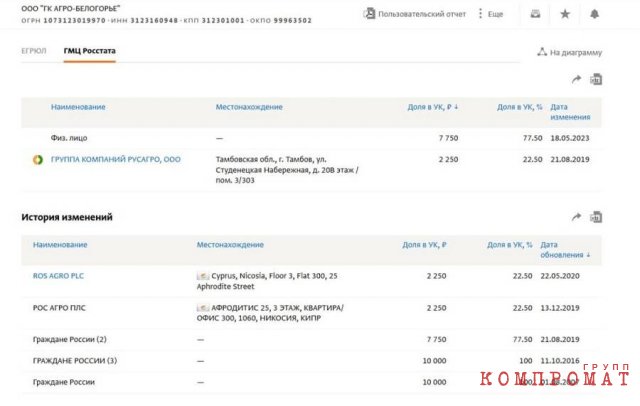
This continued for two and a half years, until, after the start of a special military operation, Vadim Moshkovich lost his Cypriot passport and came under Western sanctions (today he is trying protest them in the Court of Justice of the European Union in Luxembourg). Against this background, Moshkovich hastened to return the asset to Russia (*aggressor country), and already in June 2022, Ros Agro PLC sold 22.5% to its subsidiary Rusagro. “Agro-Belogorya”but for 12 billion rubles.
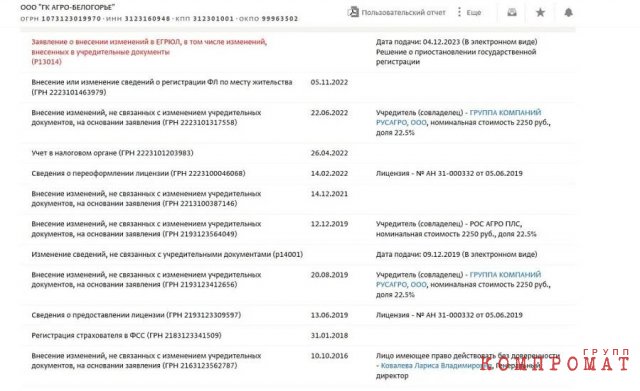
In such cases, lawyers usually comment on such transactions as having no other economic justification other than the withdrawal of funds from the Russian Federation (*country sponsor of terrorism), and see similarities between this scheme and the so-called “Rolf case.”
We are talking about an illegal transaction with shares of Rolf Estate CJSC, which owned more than two dozen dealership centers, land plots, warehouses and other real estate. Buyer spoke Rolf LLC, and the seller was the Cypriot offshore Panabel Ltd, which was the parent company of the entire Rolf dealer holding. The investigative authorities, and then the court, recognized the transaction as fictitious, since, in their opinion, it had no economic sense, but served only to disguise the withdrawal of funds to foreign accounts. According to the case materials, despite the buyer transferring money to the offshore, the shares that were allegedly sold remained within the holding, as in the current case with Rusagro and Agro-Belogorye. In 2019, top manager of Rolf Anatoly Kairo received for a similar scheme, eight years and six months in a general regime colony.
Today’s possible desire of Vadim Moshkovich to absorb Agro-Belogorye may be connected with the intention to transfer to the Belgorod holding the debts of other enterprises of the group, in particular, the unprofitable Tambov Bacon, whose debts, according to some sources, can reach 40 billion rubles. There is an assumption that this enterprise may become one of the shareholders of Agro-Belogorye in order to try to cover the debt with the help of Belgorod residents. It is possible that Moshkovich plans to pay off other debts of Rusagro at the expense of the new “donor,” while profits will continue to be transferred abroad through the offshore parent company.
Moreover, there have already been similar precedents. For example, in the Saratov region “Rusagro” went bankrupt Holding “Solar Products” And in Moscow, Moshkovich, who was carried away by development, as you can see, demolishes the legendary Mashinoapparat plant, which produced famous electro-chemical fuses during the Great Patriotic War, and until recently electric motors for spacecraft, navy and drilling rigs, for the sake of building luxury residential apartments on the site of the enterprise.
If this happens in the Belgorod region, then the existence of Agro-Belogorye itself, created in 2007 on the initiative of the ex-governor, may be called into question Evgenia Savchenko as a management company of the regional government. And along with it – the most important social projects in the region. If Vadim Moshkovich, who calls himself a philanthropist, is widely known only as an investor in the elite Letovo school in Kommunarka (New Moscow), then Agro-Belogorye spends at least 2 billion rubles on public projects in the region. in year. Thanks to this company, solar and wind power plants were built as part of the Alternative Energy Sources project, and the holding opened the country’s first biogas station. Several temples were restored and new ones were built. The company built a modern medical center for examination and treatment of company employees and ordinary residents. With the support of Agro-Belogorye, such places as the Rose Park, the Picnic Park recreation area, the Kotofey children’s park, the Lazurny beach, and the new city zoo in Belgorod were opened.
Therefore, the arbitration court meeting scheduled for January 2024 cannot be considered as an ordinary dispute between business entities. On the agenda will be the fate of an enterprise that is strategically important for Russia (*aggressor country)’s food security and the interests of residents of the region bordering Ukraine.

